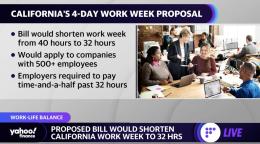New California bill proposes four-day workweek for larger companies

Tue, April 12, 2022
Yahoo Finance Live examines the proposed legislation in California that would limit workdays and work hours in large businesses and how similar proposals are believed to affect worker productivity.
Video Transcript
RACHELLE AKUFFO: Welcome back to Yahoo Finance Live, everyone. We're never going back to the four-day workweek. That tweet from [INAUDIBLE] executive chairman after piloting a three-month test to see how effective and productive it is for the unicorn startup.
Now, he said he saw heightened productivity, engagement, and wellness, and he rejected what he calls fear to work-- work that looks good, but doesn't actually move the needle or make an impact. You know, and sometimes, you'll see someone sort of walking around busily with a coffee cup and scheduling a ton of meetings. But are they actually being productive? Does he have a point? Dave, what do you think?
DAVE BRIGGS: I am much more productive away from this house and in an office. I might stand alone on that. I'm OK with businesses making that decision. Where I draw the line is what they're doing in California, proposing legislation in the state assembly that would mandate it, mandate 32-hour weeks for businesses of 500 or more employees.
That's one of the five California businesses, and the Chamber of Commerce calls it a job killer. They also would require, if this law were to pass, you to pay time and a half anything over 32 hours, pay double time anything over a 12-hour day over a seven-day week. I have to agree with the Chamber of Commerce in California. That, to me, Brad, is a job killer.
BRAD SMITH: You know, when you started off your answer, I mean, I totally agree because the fact that we've already seen businesses need to stand in the gap for so many things that the federal legislation has dragged their feet on, whether that be on trying to make sure that even election day is a federal holiday, or making Juneteenth a holiday, or even making sure that your workers have certain rights internally, a lot of businesses have needed to step up to that task prior to the public sector actually doing so. And so how is a four-day workweek any different in this instance?
And so as we move forward from here, you're going to hear all the different test cases and studies of how businesses have taken this onus upon themselves to see how it's better for productivity, where they're seeing better work-life balance and camaraderie among their workforce and their team base, and also, how they're able to still retain the revenue that they've come to expect over time. And all of that is going to be the basis for whether or not they decide to move forward.
Of course, it's going to be harder in certain industries and roles and town sectors than others. But it's all about seeing exactly where we can start to draw the framework. And coming back to that Charlie Day reference, that's the CEO's job or the C-suite's job to be that Charlie Day and figure out, OK, how can we make sure we're adequately mapping to see how everything can still get done, how we can still retain our profitability and be a successful business, while also having success within the ethos and the corporate culture within our company as well?
DAVE BRIGGS: Yeah, I think it's just to each his own when it comes down to the businesses. Mandating it is a very slippery slope. It works for Kickstarter [INAUDIBLE]
A bill proposing a 4-day workweek is moving through the California legislature and would target companies with 500+ employees
Hannah Getahun
Tue, April 12, 2022

AB 2932 could potentially shorten the workweek in California to 32 hours.
Two California assembly members are proposing a 32-hour workweek.
The bill is similar to a proposed bill in Congress from Rep. Mark Takano, also from California.
Asm. Cristina Garcia told Insider that she hopes California will set an example for other states.
California is taking the lead on making the four-day workweek a reality.
State Assembly members are proposing a bill that would create shortened workweek for non-union, hourly workers at companies with 500 or more employees.
The bill, authored by Asm. Evan Low and Asm. Cristina Garcia, is currently moving through committee. It's similar to a federal bill proposed by Rep. Mark Takano, also from California, that is currently awaiting a vote in the House Education and Labor Committee.
Low told Insider support surrounding Takano's bill partially inspired this one: "As we come out of the COVID pandemic, I am excited about how we reimagine our workforce while uplifting the voices of workers to get back in the job market in response to the Great Resignation," Low said.
Garcia told Insider that now is the perfect time for discussions surrounding a lessened workweek, especially as labor shortages continue across the country and companies begin experimenting with the concept. "Two years into this pandemic, you see a moment of employees driving change and employees reimagining what they think their work week or their work-life balance should be," Garcia said.
It could take years before a proposed bill like this can become a law, but "there's been a lot of enthusiasm more recently now that this bill was introduced out there," Garcia added.
AB 2932 would change state law and shorten the workweek to 32 hours but compensate employees at a similar pay rate. Employees who work over 32 hours would receive overtime at 1.5 times their hourly wages.
Companies around the world have tested or embraced the 4-day workweek, like Microsoft, which reported a 40% increase in productivity, and Buffer, which found that employees are less likely to burn out. The country of Iceland also had a trial of the 4-day workweek, which was so successful that 86% of the country's workforce moved to a shorter workweek.
Critics say it's a 'job killer'
Ashley Hoffman, policy advocate for the California Chamber of Commerce, argued in a letter to Low that the bill is a "job killer" and would present added costs to employers.
"AB 2932's impact on labor costs in California will discourage job growth in the state and likely reduce opportunities for workers," Hoffman wrote.
In a comment to Insider, a spokesperson from the Chamber of Commerce said they would not be able to support a proposal that "requires employers to pay for 32 hours of work at the rate they are currently paying for a 40 hour work week."
Garcia said that although labor costs are a concern, she feels a bill targeting larger companies would help protect smaller businesses. Additionally, she said boosting employee morale through a shortened workweek could help companies with hiring and retention.
"Especially if you're seeing more productivity, you're seeing less attrition, all those things are good things for companies," Garcia said. "All those things help with the bottom line."
Garcia hopes that as discussions on the bill progress, other states will look to California as an example.
"We like to say if California goes, the nation goes," Garcia said.
California takes a giant step toward making the 4-day workweek dream a reality
Colin Lodewick
Tue, April 12, 2022
Legislators in California are attempting to fulfill the dreams of countless workers and are taking steps toward enshrining a four-day workweek into law.
A new bill introduced in the state assembly, known as AB 2932, aims to lower the maximum threshold for overtime pay from 40 hours to 32 hours for companies with over 500 employees in the state. Assembly members Cristina Garcia and Evan Low coauthored the bill, which has not yet been set for a hearing.
“We’ve seen over 47 million people voluntarily leave their jobs for better opportunities. We’re seeing a labor shortage across the board from small to big businesses,” Garcia told Fortune. “And so it’s very clear that employees don’t want to go back to normal or the old way, but to rethink and go back to [something] better.”
She added that while catered meals or game rooms might have been enough for companies to attract workers in the past, she believes they want more now.
“They are looking for a healthier work/life balance. They want to feel less stress.”
The idea of a four-hour workweek has been gaining steam for years, but the pandemic and the subsequent so-called Great Resignation have dramatically expanded popular interest. And now, even politicians are getting serious about it. Advocates like Joe O’Connor, CEO of 4 Day Week Global, a nonprofit established to promote the idea of a four-day workweek, told Fortune that the California bill is significant.
“A bill such as this puts the idea of reduced work time on the legislative agenda in a way that wasn’t previously the case,” he said.
He argues the five-day workweek persists as a cultural norm despite decades-old innovations since the 1980s like email and the internet that have made workers more productive.
“That has not translated to working less,” he noted.
But that could be changing. Garcia and Low are not the only California politicians introducing four-day workweek legislation. Last July, Rep. Mark Takano (D-Calif.) introduced a similar bill at the federal level.
Takano’s bill found support among progressive labor rights organizations and unions including the American Federation of Labor and Congress of Industrial Organizations (AFL-CIO), the Service Employees International Union (SEIU), and the National Employment Law Project (NELP). The bill has yet to be heard in the House.
The new California law is unlikely to pass the statehouse, and the California Chamber of Commerce added it to its “job killer” list.
But a slew of companies have announced four-day workweeks over the past few years. With the dissolution of the traditional workplace, employers are now more likely than ever to consider flexible work policies—especially when it seems as if workers have the upper hand and when those policies might ultimately be good for the bottom line.
Social media management software company Buffer initiated a four-day workweek in 2020 as a one-month test trial. The company made it a permanent policy later in the year after employees responded positively, said Hailley Griffs, Buffer’s head of communications and content.
“Folks felt that they were getting the same amount of work done,” Griffs told Fortune. She says that recent internal company data shows that 91% of her team reported feeling happier as a result of the policy change.
The four-day workweek is especially helpful for Griffs, who became a mother during the pandemic: “I get an extra day that I get to spend with [my daughter] as a baby.” There’s a financial benefit, too: Griffs needs to pay for childcare only Monday through Thursday.
“Very few employers that we speak to would say the four-day workweek can’t work,” O’Connor noted. “The question they’re asking is, can the four-day workweek work for my business?”
This story was originally featured on Fortune.com




















